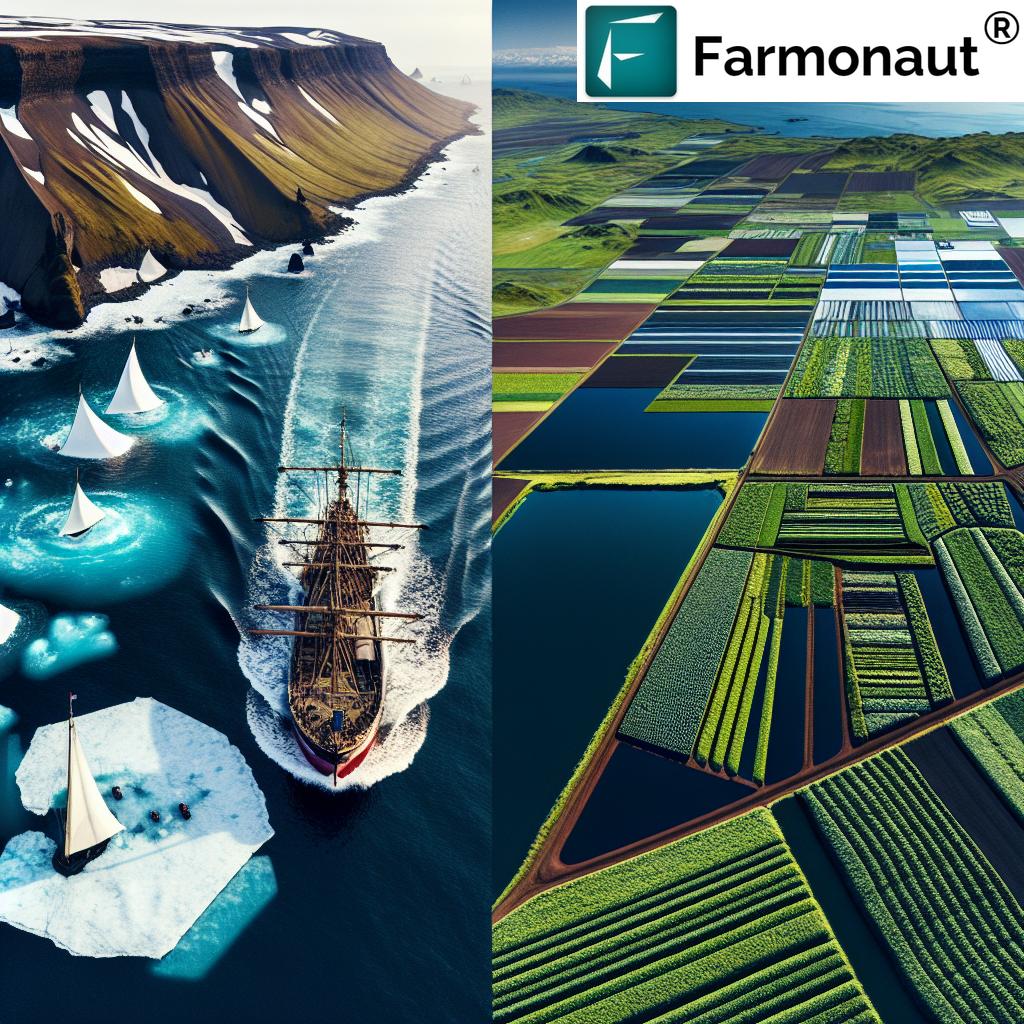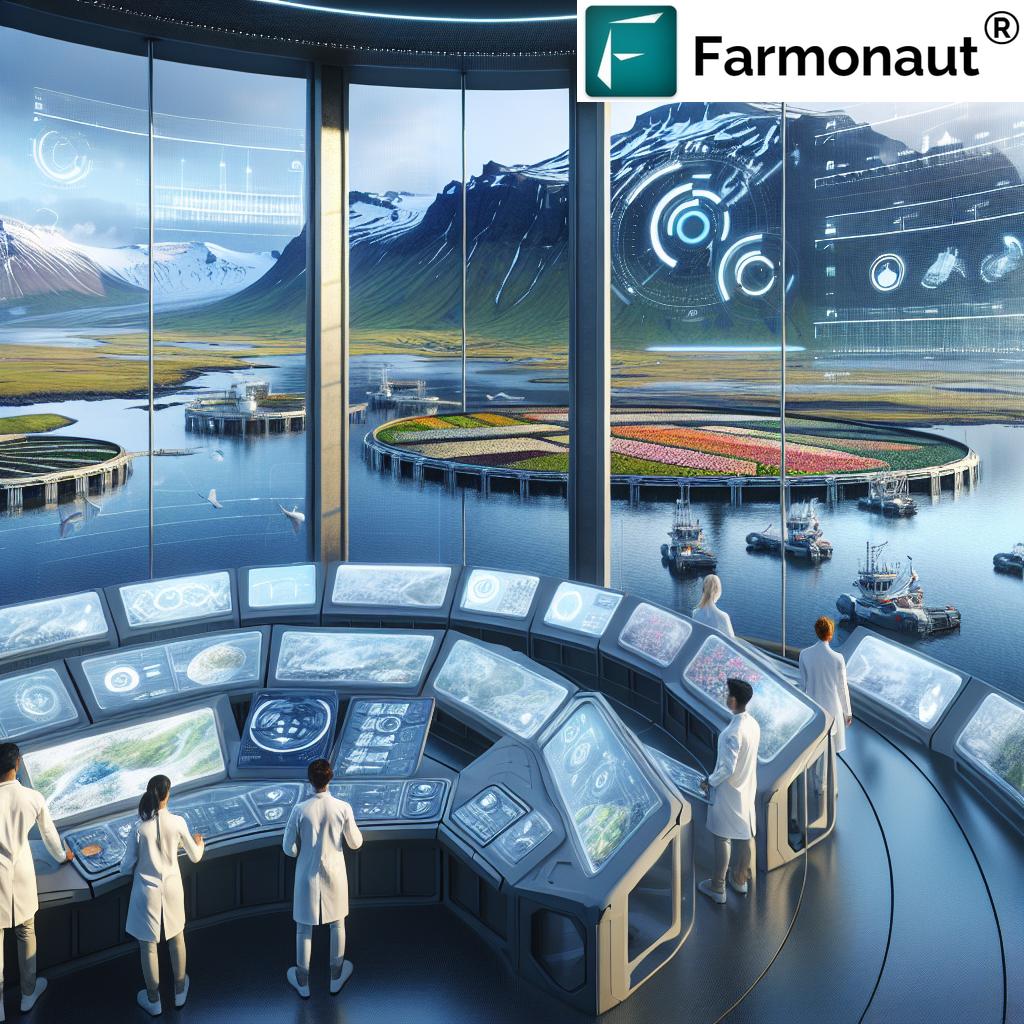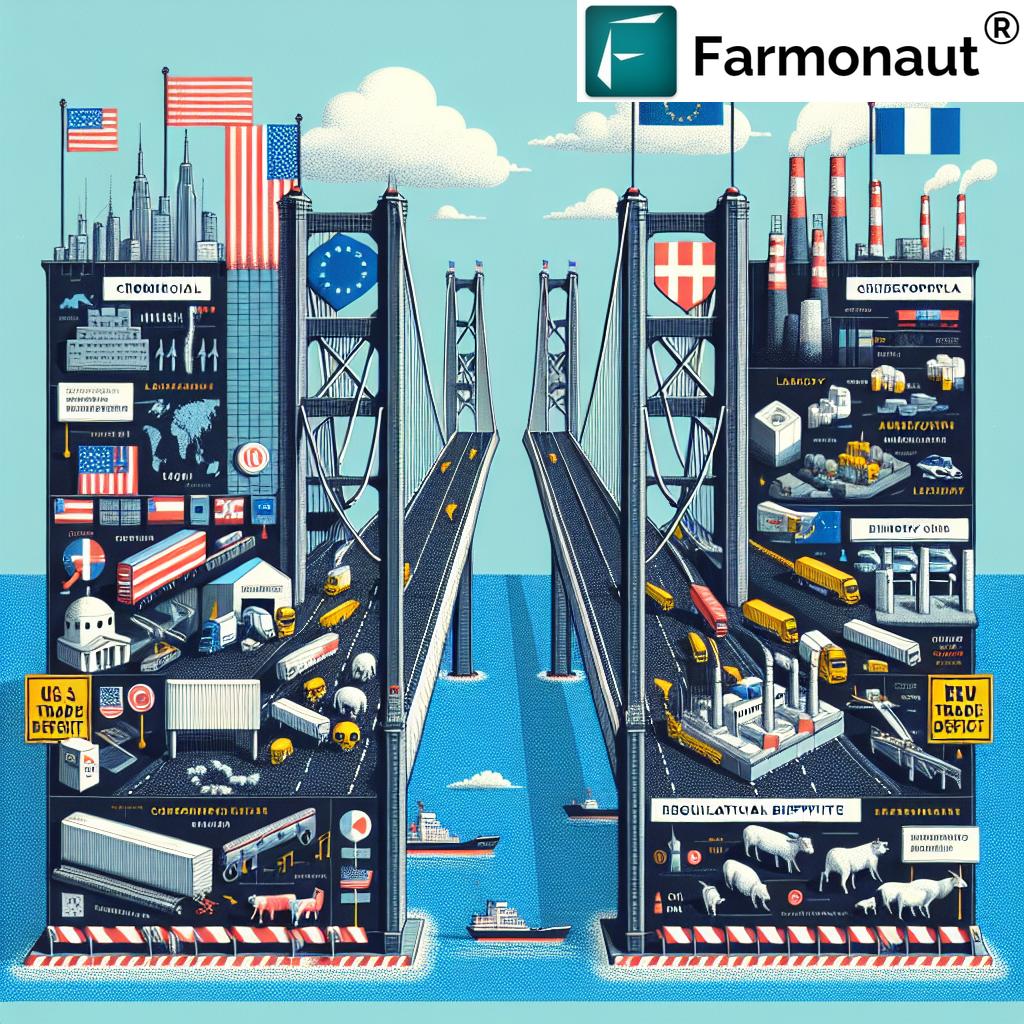Iceland’s Controversial Whaling Decision: Environmental Impact and Sustainable Alternatives for Marine Conservation
“Iceland’s whaling industry affects over 150 marine species in the North Atlantic ecosystem.”
In recent developments that have sparked intense debate across the globe, Iceland’s caretaker government has made a controversial decision to issue new whaling licenses. This move has reignited discussions on marine conservation, sustainable fisheries management, and the delicate balance between traditional practices and environmental stewardship in the North Atlantic. As experts in agricultural technology innovations and remote sensing, we at Farmonaut are deeply concerned about the implications of this policy shift on marine ecosystems and regional economies.
In this comprehensive analysis, we will delve into the multifaceted challenges presented by Iceland’s whaling decision, explore the environmental impact, and propose sustainable alternatives that could pave the way for a more harmonious coexistence between economic interests and conservation efforts.
Understanding Iceland’s Whaling Decision
On December 6, 2023, Iceland’s caretaker government announced the issuance of five-year hunting licenses for fin and minke whales. This decision allows two companies, Hvalur hf. and Tjaldtangi ehf., to hunt a staggering 209 fin whales and 217 minke whales annually from 2025 to 2029. These quotas are based on assessments by the North Atlantic Marine Mammal Council, which suggests a recovering fin whale population in Icelandic waters. However, it’s crucial to note that minke whale numbers near Iceland have been declining.

This decision stands in stark contrast to the international consensus on whale conservation. Despite a 1986 moratorium by the International Whaling Commission (IWC), Iceland remains one of only three countries that continue to allow commercial whaling. The others are Norway and Japan. This persistence in whaling practices has placed Iceland at odds with global conservation efforts and has raised significant concerns about the country’s commitment to marine biodiversity protection.
The Environmental Impact of Whaling
The environmental consequences of whaling extend far beyond the direct impact on whale populations. Whales play a crucial role in marine ecosystems, and their removal can have far-reaching effects:
- Ecosystem Disruption: Whales are key players in the marine food web. Their removal can lead to imbalances that affect numerous other species.
- Carbon Sequestration: Whales contribute significantly to carbon sequestration in the oceans. Their loss could impact the ocean’s ability to mitigate climate change.
- Nutrient Cycling: Whale excrement provides essential nutrients that support plankton growth, forming the base of the marine food chain.
- Biodiversity Loss: The hunting of whales, especially vulnerable species like fin whales, contributes to the overall loss of marine biodiversity.
At Farmonaut, we believe that sustainable agriculture practices and marine conservation technologies can offer viable alternatives to practices that harm marine ecosystems. Our expertise in satellite crop monitoring and precision agriculture techniques can be adapted to support coastal communities in developing more sustainable economic activities.
The Economic Argument: Whaling vs. Sustainable Alternatives
While proponents of whaling often cite economic benefits, a closer examination reveals a different picture:
- Declining Demand: The demand for whale products has been steadily decreasing, both domestically and internationally.
- Financial Losses: Companies like Hvalur hf. have reported losses from their whaling activities, questioning the economic viability of the industry.
- Limited Market: With only Japan and Norway allowing the import of fin whale products, the market for Icelandic whale meat is extremely limited.
- Negative Impact on Tourism: Iceland’s whaling practices could harm its image as an eco-friendly destination, potentially impacting its thriving tourism industry.
In contrast, sustainable alternatives offer promising economic opportunities:
- Eco-Tourism: Whale watching and other marine-based tourism activities can provide significant economic benefits without harming whale populations.
- Sustainable Fishing Practices: Implementing advanced fisheries management techniques can ensure long-term viability of fish stocks and support local economies.
- Coastal Agriculture: Utilizing agricultural technology innovations like those offered by Farmonaut can help coastal communities develop sustainable land-based economic activities.
The Role of Technology in Marine Conservation
Advancements in technology offer new possibilities for marine conservation and sustainable resource management. At Farmonaut, we specialize in remote sensing in agriculture, which can be adapted for marine applications:
- Satellite Monitoring: Our expertise in satellite crop monitoring can be applied to track whale populations, monitor marine habitats, and detect illegal whaling activities.
- AI-Powered Analysis: Advanced algorithms can process vast amounts of data to provide insights into marine ecosystem health and whale migration patterns.
- Blockchain for Traceability: Blockchain technology can ensure transparency in sustainable fishing practices and prevent the illegal trade of whale products.
These technologies can play a crucial role in sustainable fisheries management and support environmental impact assessment efforts in marine conservation.
“Satellite crop monitoring can increase coastal farm productivity by up to 20%, offering economic alternatives to whaling.”
International Pressure and Conservation Efforts
Iceland’s decision to issue new whaling licenses has not gone unnoticed on the international stage. Conservation organizations and animal welfare groups have voiced strong opposition to this move. The international community’s response includes:
- Diplomatic Pressure: Countries and international bodies are likely to exert diplomatic pressure on Iceland to reconsider its whaling policies.
- Economic Sanctions: There’s a possibility of economic repercussions, including potential boycotts of Icelandic products or tourism.
- Scientific Collaboration: International scientific bodies are calling for more comprehensive studies on the impact of whaling on marine ecosystems.
As experts in agricultural policy analysis, we at Farmonaut understand the importance of balancing economic interests with conservation efforts. We believe that international cooperation and the adoption of sustainable farming solutions can provide a path forward that benefits both the economy and the environment.

The Future of Marine Conservation in Iceland
As we look to the future, it’s clear that Iceland stands at a crossroads. The decision to continue whaling practices contradicts global trends towards marine conservation and sustainable resource management. However, there are promising signs of change:
- Declining Public Support: A 2024 poll revealed that a significant portion of the Icelandic population believes whaling harms the country’s international standing.
- Economic Shifts: The questionable profitability of whaling operations is prompting a reevaluation of economic priorities.
- Technological Advancements: The integration of technologies like those offered by Farmonaut in marine conservation efforts is opening new possibilities for sustainable resource management.
We believe that Iceland has the potential to become a leader in marine conservation by embracing sustainable alternatives to whaling. This transition could involve:
- Investing in Eco-Tourism: Developing world-class whale watching and marine wildlife experiences.
- Sustainable Fishing Practices: Implementing cutting-edge technologies for responsible fisheries management.
- Coastal Agriculture Development: Utilizing precision agriculture techniques to support coastal communities with sustainable land-based economic activities.
- Marine Research Hub: Positioning Iceland as a global center for marine conservation research and innovation.
Comparative Analysis: Whaling vs. Sustainable Alternatives
| Approach | Economic Impact (Est. Annual Revenue) | Environmental Impact (Est. Carbon Footprint) | Job Creation (Est. Number) | International Relations | Ecosystem Health |
|---|---|---|---|---|---|
| Traditional Whaling | $10-15 million | High (500,000 tons CO2e) | 100-200 | Negative | Detrimental |
| Sustainable Fishing Practices | $50-100 million | Moderate (200,000 tons CO2e) | 1,000-2,000 | Positive | Balanced |
| Eco-Tourism | $100-200 million | Low (50,000 tons CO2e) | 2,000-5,000 | Very Positive | Supportive |
| Precision Agriculture in Coastal Regions | $30-50 million | Low (30,000 tons CO2e) | 500-1,000 | Positive | Neutral to Positive |
| Satellite-based Marine Resource Management | $20-40 million | Very Low (10,000 tons CO2e) | 300-600 | Very Positive | Very Supportive |
This comparative analysis clearly illustrates the advantages of sustainable alternatives over traditional whaling practices. The economic benefits, job creation potential, and positive impact on international relations make a compelling case for transitioning away from whaling.
The Role of Farmonaut in Supporting Sustainable Alternatives
At Farmonaut, we are committed to promoting sustainable practices through our advanced agricultural technology solutions. While our primary focus is on land-based agriculture, many of our technologies and approaches can be adapted to support sustainable alternatives to whaling in coastal regions:
- Satellite Monitoring for Marine Ecosystems: Our expertise in satellite crop monitoring can be applied to track marine habitats, monitor whale populations, and support conservation efforts.
- Precision Agriculture for Coastal Farming: Our precision agriculture techniques can help coastal communities develop sustainable land-based agricultural practices, providing economic alternatives to whaling.
- Data-Driven Decision Making: Our AI-powered advisory systems can be adapted to provide insights for sustainable fisheries management and marine resource conservation.
- Blockchain for Traceability: Our blockchain solutions can ensure transparency in sustainable fishing practices and eco-tourism activities.
By leveraging these technologies, we can support Iceland and other coastal nations in developing sustainable economic activities that protect marine ecosystems while providing viable livelihoods for local communities.
The Path Forward: Recommendations for Sustainable Marine Management
Based on our analysis and expertise, we propose the following recommendations for Iceland and other nations grappling with the challenge of balancing economic interests with marine conservation:
- Phased Transition from Whaling: Implement a gradual phase-out of whaling activities, coupled with support for affected communities to transition to sustainable alternatives.
- Investment in Marine Conservation Technologies: Allocate resources to develop and implement advanced technologies for marine ecosystem monitoring and protection.
- Promotion of Eco-Tourism: Develop world-class whale watching and marine wildlife experiences to capitalize on Iceland’s unique marine biodiversity.
- Sustainable Coastal Agriculture: Utilize precision agriculture techniques to develop sustainable land-based economic activities in coastal regions.
- International Collaboration: Engage in international partnerships for marine conservation research and sustainable fisheries management.
- Public Education and Awareness: Implement comprehensive programs to educate the public about the importance of marine conservation and sustainable practices.
- Policy Reform: Develop and implement policies that incentivize sustainable practices and discourage activities harmful to marine ecosystems.
By adopting these recommendations, Iceland can position itself as a global leader in marine conservation while ensuring the economic well-being of its coastal communities.
Conclusion: A Sustainable Future for Iceland’s Marine Resources
Iceland’s decision to issue new whaling licenses represents a critical juncture in the country’s approach to marine resource management. While the short-term economic benefits of whaling may seem appealing, the long-term consequences for marine ecosystems, international relations, and sustainable development are significant.
As experts in agricultural technology and sustainable resource management, we at Farmonaut firmly believe that Iceland has the potential to chart a new course. By embracing sustainable alternatives, leveraging advanced technologies, and prioritizing marine conservation, Iceland can create a thriving, sustainable blue economy that benefits both its people and the planet.
The transition from whaling to sustainable practices will require commitment, innovation, and collaboration. However, the potential rewards – a healthy marine ecosystem, a robust and diverse economy, and a positive international reputation – far outweigh the challenges.
As we move forward, let us remember that the choices we make today will shape the health of our oceans and the well-being of coastal communities for generations to come. It’s time for Iceland, and indeed all nations, to choose a path of sustainability, conservation, and responsible stewardship of our precious marine resources.
FAQ Section
Q1: Why is Iceland still allowing whaling despite international opposition?
A1: Iceland cites cultural traditions and economic reasons for continuing whaling. However, the practice is increasingly controversial and economically questionable.
Q2: How does whaling impact marine ecosystems?
A2: Whaling disrupts marine food chains, affects biodiversity, and can lead to imbalances in ocean ecosystems. Whales play crucial roles in nutrient cycling and carbon sequestration.
Q3: What are some sustainable alternatives to whaling?
A3: Sustainable alternatives include eco-tourism (like whale watching), sustainable fishing practices, coastal agriculture using precision techniques, and marine research and conservation activities.
Q4: How can technology help in marine conservation efforts?
A4: Technologies like satellite monitoring, AI-powered data analysis, and blockchain for traceability can significantly enhance marine conservation efforts and sustainable resource management.
Q5: What role can companies like Farmonaut play in promoting sustainable alternatives to whaling?
A5: Companies specializing in agricultural technology can adapt their solutions for marine applications, supporting sustainable coastal agriculture, fisheries management, and ecosystem monitoring.
For more information on how Farmonaut’s technologies can support sustainable practices, visit our API Developer Docs or explore our API.
Download our mobile apps for on-the-go access to our agricultural technology solutions:
For access to our web application, click here:




















